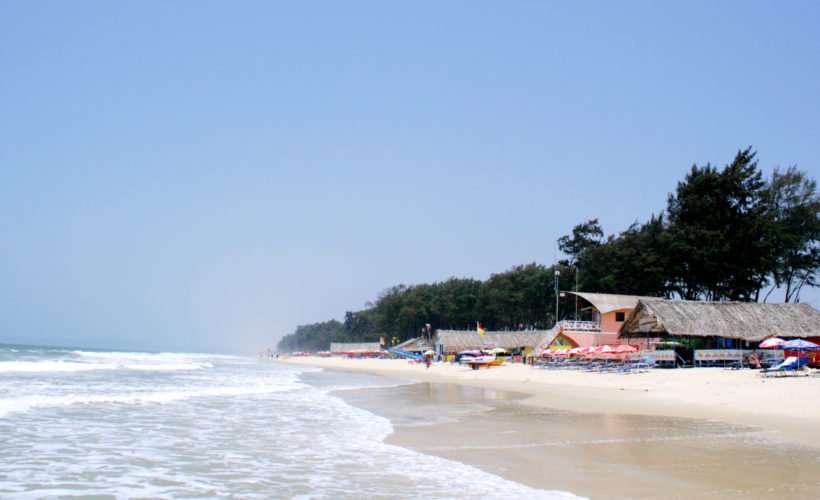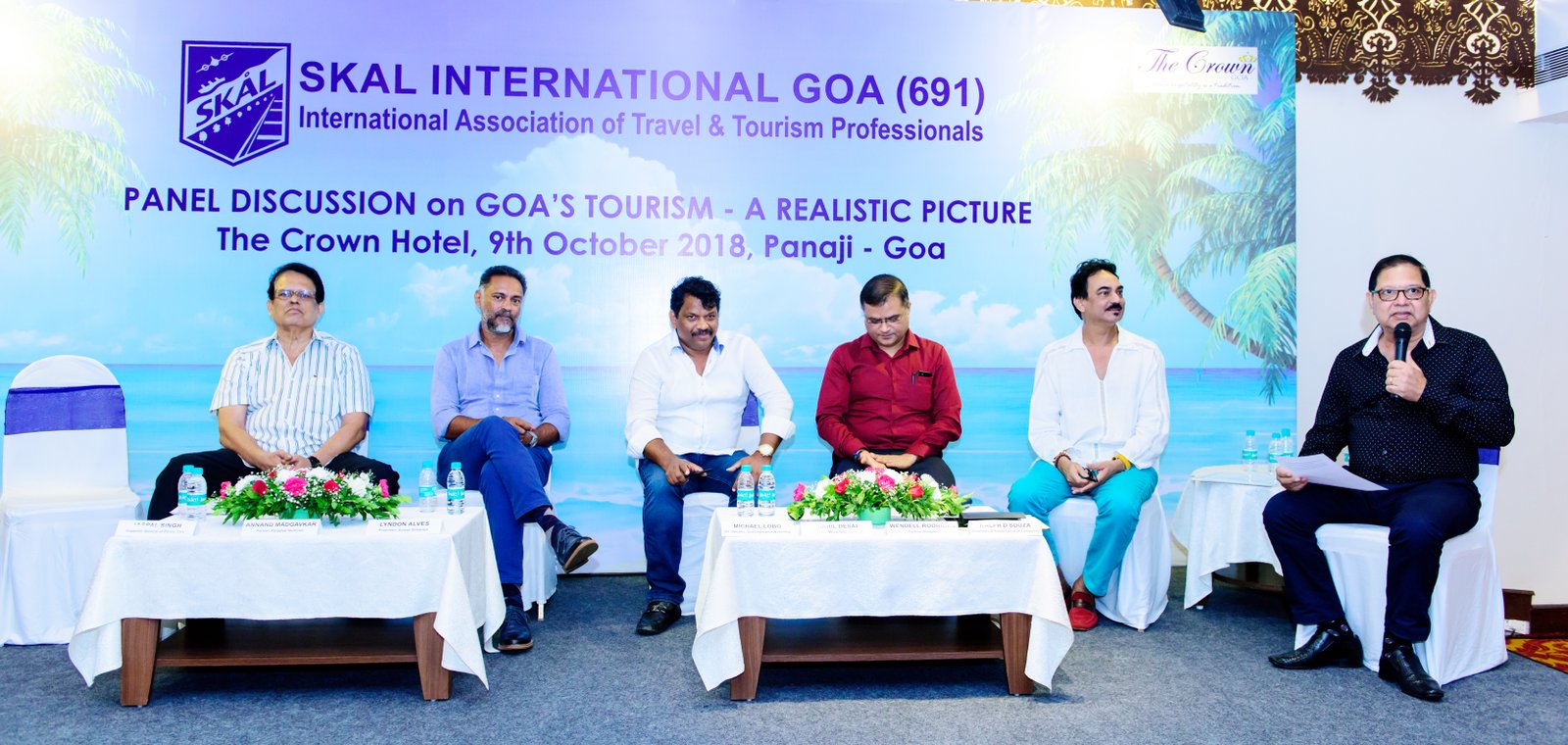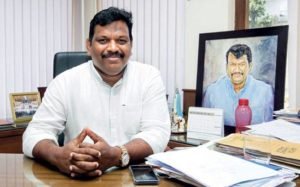
Once known as the “Pearl of the Orient”, a “Tourist Paradise”, the greatest “Holiday Destination”, the state of Goa has come a long way since then. Goa, today, is grappling with a number of woes from infrastructure to lawlessness to the ever exploding garbage. The seeds of corruption have grown into a full-fledged harvest of crime, drugs and prostitution. However, key stakeholders who debated and deliberated on Goa’s tourism potential and future, at an event organised by SKAL International Goa, refuse to be cowed down by the circumstances and are willing to put on a good fight to bring back the glory days for the state’s tourism business, writes ANNA FERNANDES
Goa’s tourism industry has been rapidly flourishing, drawing an influx of international and domestic tourists to the state’s natural beauty. But has this proved beneficial to the state is a question that needs to be looked into.
Once, the number one holiday destination in the country and one of the top ten holiday destinations in the world, Goa’s flourishing tourism industry has witnessed a gradual downslide in recent years. Today, while we still have a thriving scene of domestic tourists, there seems to be a declining scene of higher-spending international tourists, who for a number of reasons – garbage strewn on the roadsides, overdevelopment of beach areas, lawlessness – are opting for other destinations.

“It is a disgrace that we have this problem about garbage when it can so easily be solved. One garbage plant in Saligao is not enough to handle all the garbage that we create. We need to have a sustained effort in every village, supported by the government, so that we can handle our garbage”
Wendell Rodricks
Fashion Designer
In a panel discussion on the topic “Goa’s tourism – a realistic picture” organised by SKAL International Goa, an international association of travel and tourism professionals, a number of eminent personalities from around Goa voiced their opinions on a variety of issues that have been plaguing the state’s tourism industry. The discussion was held in the presence of leading stakeholders of the tourism industry in Goa. The panellists for the discussion included Anand Madgavkar, Partner, Paradise Ventures; Lyndon Alves, Proprietor, Sunset Getaways; Michael Lobo, Deputy Speaker of Goa Legislative Assembly and MLA of Calangute; Nikhil Desai, Managing Director, Goa Tourism Development Corporation (GTDC); Wendell Rodricks, Fashion Designer; and Ralph de Sousa, Chairman of the De Souza Group of Companies who moderated the discussion.

One of the biggest issues that Goa faces today is the problem of garbage. In spite of our PM’s Swachh Bharat initiative, our cities continue to be strewn with garbage, with no clear solution in sight. Weighing in on this issue, Wendell Rodricks, said, “It is a disgrace that we have this problem about garbage when it can so easily be solved. One garbage plant in Saligao is not enough to handle all the garbage we create. We need to have a sustained effort in every village, supported by the government, so that we can handle our garbage.” He also added that it is the lack of civic sense among not only tourists but also the general public that has led to the explosion of garbage. “The younger generation needs to be educated on the problem of garbage.” He urged the government to work towards proper segregation of waste, spreading awareness, and setting up dustbins. He also urged the hotel industry to be innovative in dealing with plastic waste, as a lot of the same is usually generated by hotel guests. Lyndon Alves, stated: “We need to utilise the media to create awareness among tourists about cleanliness.” He further added that littering in the state has been happening as the state does not have strict rules in place to penalise the guilty. The public has to be taught that littering is unacceptable, and fines must be imposed. Authorities need to act severely against those responsible for littering. Alves also drew attention to the absence of garbage bins in many areas that have led to the garbage menace in the state, suggesting that hotels and corporates ought to take up CSR initiatives such as beach-cleaning drives, providing garbage bins, etc.

“Goa is a clean and safe destination with good standards and infrastructure. Looking ahead, Goa does not need to be further beautified. All we need to do is make it a clean and safe destination, with sufficient water and electricity supply, and proper government control to preserve its beauty culture and heritage”
Ralph de Sousa
Chairman, De Souza Group
While efforts are being taken to tackle the garbage menace, the status quo on the much talked about taxi issue or the “taxi-mafia” remains. Due to the inadequacy of public transport in the state, tourists are compelled to depend on taxis that charge them exorbitantly. In an attempt to tackle this issue, by December, taxis will be fitted with digital meters, Nikhil Desai said, adding that these will be equipped with GPS systems and will have features that will enable the department to keep a check on operators to ensure they issue printed receipts. The permit will state that if taxi operators fail to issue a printed receipt to their clients, it will be considered a free ride, he said. According to Nikhil Desai, the government is also set to introduce a new legislation for the tourism industry, one with more teeth, which will enable it to deal with various illegalities in the sector, especially the growth of the unorganized sector. He added that the Tourist Trade Act will be replaced with a new legislation making the statement after co-panellists Michael Lobo, Wendell Rodricks, Anand Madgavkar and Lyndon Alves – stressed on the unorganised growth in the industry. Desai also shed light on the difficulties the tourism department is facing with regards to keeping a check on those running tourism-related trades, like letting of rooms, without registering with the department. This segment, which takes advantage of technology to run its activities, is placing additional stress on the tourism infrastructure, he said. Weighing in on this point, Ralph de Sousa states, “Mass tourism is detrimental to the sustainability and carrying capacity of a small state like Goa. With our limited facilities and infrastructure, we just can’t afford to entertain tourists in mad numbers. We have to take the size of Goa and its population into consideration.”

“The government is also set to introduce a new legislation for the tourism industry, one with more teeth, which will enable it to deal with various illegalities in the sector, especially the growth of the unorganized sector. The Tourist Trade Act will be replaced with a new legislation”
Nikhil Desai
MD, Goa Tourism Development Corporation
Amid all this, the underbelly of corruption in the state has also picked up, with sinful demands being met courteously. A major cause of concern in the state is the illegal activities such as prostitution, gambling and drugs that continue to thrive in Goa. Anand Madgavkar said, “All over India, we are known as the Las Vegas of India. Casinos, crime, prostitution, drugs – they all go hand in hand. It is up to the hoteliers to change that view of Goa – and create a new reputation for our state by hosting different events and activities in place of gambling. Casinos shouldn’t be the only reason people come down to Goa.” Reiterating this point, Wendell Rodricks said, “We need to go back to being a family destination, rather than being known as the sin capital of the country.”
Claiming that the state sees four to five drug overdose deaths every year, Michael Lobo said, “Many young girls and boys who visit Goa, visit the beach belt looking for drugs. Annually, four to five drug overdose deaths happen in the state. The police will not act if nobody questions them. Goa police take action against drug trade only when noise is made.”According to Lobo, the police only recently took action against the drug trade after being reprimanded by chief minister Manohar Parrikar. “When the legislative assembly was in session last year, everybody pounced on chief minister Manohar Parrikar. He assured to follow up with the police on a day-to-day basis on the drug issue. That month 156 drug cases were registered.”

“Many young girls and boys who visit Goa, visit the beach belt looking for drugs. Annually, four to five drug overdose deaths happen in the state. The police will not act if nobody questions them. Goa police take action against drug trade only when noise is made”
Michael Lobo
MLA, Calangute
The Calangute MLA further said that the drug menace was now a serious problem as it had spread its limbs into villages away from the coastal belt, as well. Lobo also stated that the tourism industry was ignored by the state governments in the past. “Literally, nothing was done to improve the tourism infrastructure in the state. North Goa beaches are looking cleaner now after the commissioning of the ₹150 crore garbage treatment plant,” he added.
However, as Ralph de Sousa concluded, “All is not lost.” If Goa is able to rein in the biggest threats to the tourism industry – crime, prostitution and drugs, inadequate infrastructure, garbage and litter – the future could be bright. “Goa is a clean and safe destination with good standards and infrastructure. Looking ahead, Goa does not need to be further beautified. All we need to do is make it a clean and safe destination, with sufficient water and electricity supply, and proper government control to preserve its beauty culture and heritage,” he said. The pearl of the orient, Goa, is abounding in beauty with a distinct cuisine, people and culture. It is up to us, as Goans, to strive to improve on these qualities or allow Goa’s reputation to be further tarnished. Collective action from the general public is required to combat all the grievances plaguing the tourism industry and the state. De Sousa goes on to add, “Goa needs a complete change of mindset. We have to treat our tourists as our guest to contribute to the prosperity of our state. Goa is still beautiful – all is not lost. It is not God’s own country. That privilege belongs to some other state. But if the good Lord wants to take a vacation, I think He will come to Goa”





